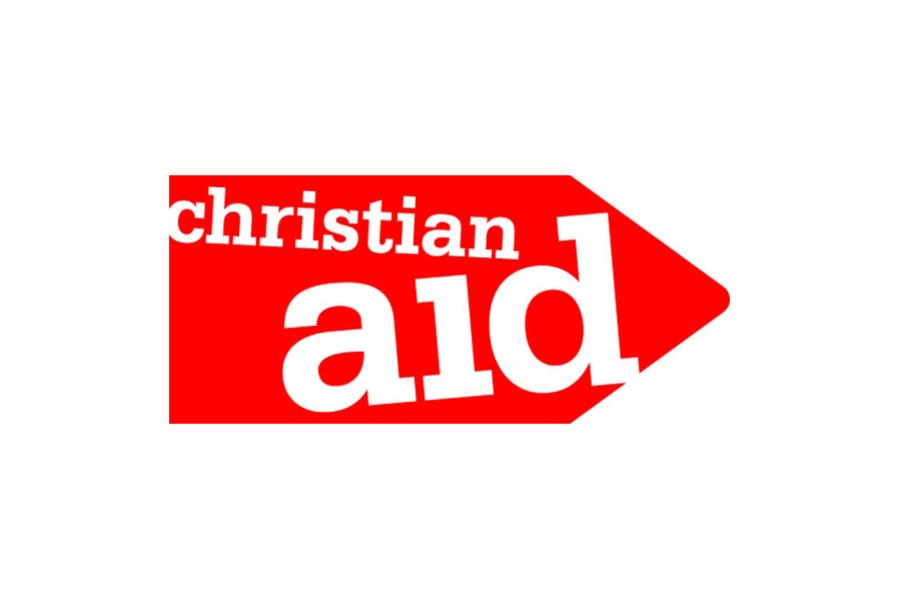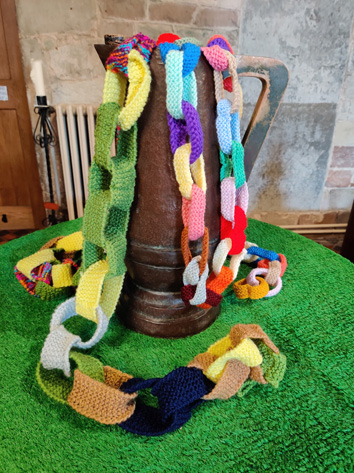 Today (18 October) is anti-slavery day. Worcester Diocesan Mothers’ Union have been working on a special awareness raising campaign across our 50 Mothers’ Union Groups and churches where the Mothers’ Union has a presence, for the week around this day.
Today (18 October) is anti-slavery day. Worcester Diocesan Mothers’ Union have been working on a special awareness raising campaign across our 50 Mothers’ Union Groups and churches where the Mothers’ Union has a presence, for the week around this day.
40.3 million people are estimated to be trapped in some form of modern slavery in the world today – a quarter of them are children! An estimated 136,000 victims are in the UK*. That number is three times the amount of men, women and children sold as slaves between the 15th and 19th centuries!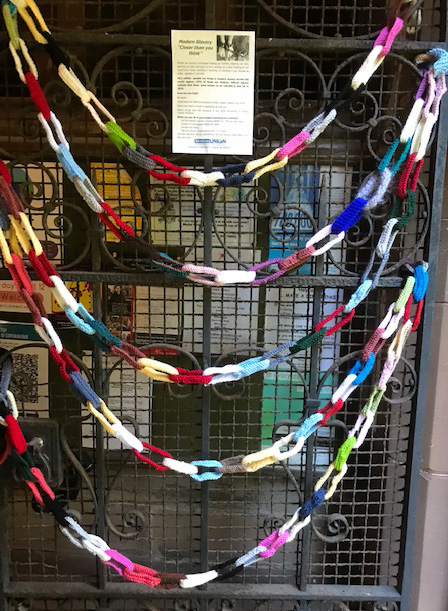
To raise awaress of the issue of modern slavery, Mothers’ Union groups, church congregations and their communities have been busy knitting and crocheting chains which are displayed ourside churches throughout the Diocese. Over 23,000 links have been knitted, which if measured from end to end would stretch for around 2 miles. The chains aim to draw attention to information displayed by Worcester MU in partnership with the Clewer Initiative.
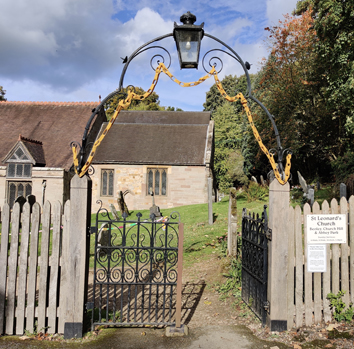 At the Cathedral there are displays and chains in College Yard, and also in churches from Malvern Priory, to Peopleton, Dines Green to Claines and St Martins, London Road, to Kinswinford, Dudley, Stourbridge, Redditch, Bromsgrove, Kidderminster, and the rural churches in the Pershore deanery.
At the Cathedral there are displays and chains in College Yard, and also in churches from Malvern Priory, to Peopleton, Dines Green to Claines and St Martins, London Road, to Kinswinford, Dudley, Stourbridge, Redditch, Bromsgrove, Kidderminster, and the rural churches in the Pershore deanery.
Judith Grubb, Worcester Mothers’ Union Diocesan President said:
“The Mothers' Union was particularly concerned about the trafficking of young girls and successfully campaigned for the 'Abolition of White Slavery Bill' in 1912, and the Mothers Union remains concerned about the trafficking of young girls as well as the lack of freedom for so many people in 2022. The MU work to improve society and strive for a stable family life for all, just as their founder Mary Sumner did, when she founded the Mothers' Union in 1876.”
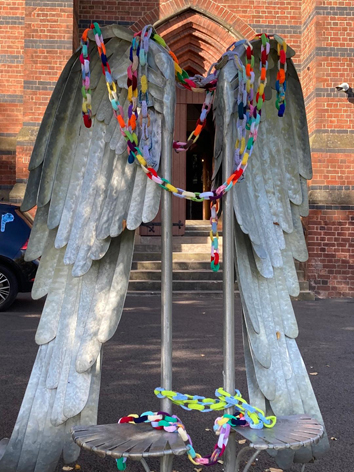 Victims of modern slavery are mostly very vulnerable – they are forced, coerced, trapped and cannot escape. They are vulnerable because they are living in poverty, live in an area with little work, they live on the streets, have mental health issues or might be drug or alcohol dependent. Here in the UK, people are trafficked from overseas, like Mo Farah who was trafficked to the UK as a child, taken to a new country by a woman he did not know, given a new name and forced to work as a domestic servant, but equally they may be British.
Victims of modern slavery are mostly very vulnerable – they are forced, coerced, trapped and cannot escape. They are vulnerable because they are living in poverty, live in an area with little work, they live on the streets, have mental health issues or might be drug or alcohol dependent. Here in the UK, people are trafficked from overseas, like Mo Farah who was trafficked to the UK as a child, taken to a new country by a woman he did not know, given a new name and forced to work as a domestic servant, but equally they may be British.
Modern Slavery is ‘Closer than you think’ – in Worcester, Redditch, Kidderminster, Dudley and Bromsgrove - perhaps you pass people trapped in slavery as you walk down the street.
And what does Modern Slavery look like? People are… sexually exploited; in domestic servitude; made to supply drugs; grow cannabis; forced to shoplift; work on building sites, farms, in nail bars or car washes.
If anyone has concerns, they can call Crimestoppers on 0800 432 0804, the Modern Slavery helpline on 08000 121 700 or the police on 101.
(*Statistics are taken from the Global Slavery Index and the Centre for Social Justice)

